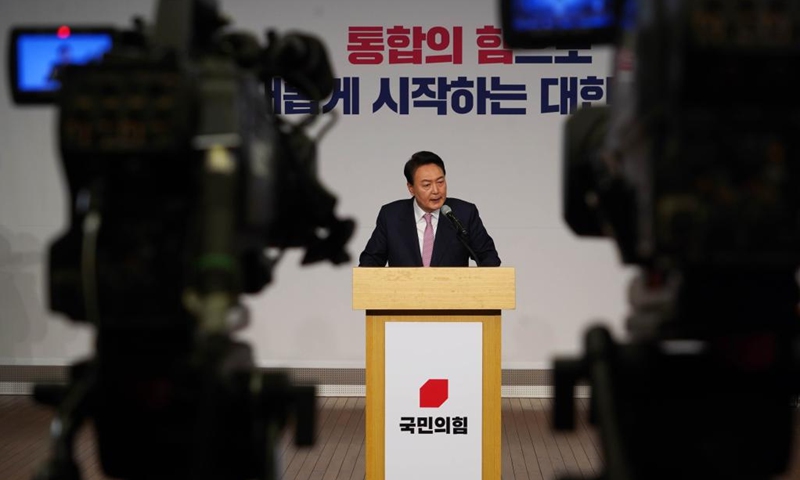
President-elect Yoon Suk-yeol speaks during a press conference at the National Assembly Library in Seoul, South Korea, March 10, 2022. Yoon Suk-yeol of the main conservative opposition People Power Party won a narrow victory in the South Korean presidential election amid people's aspiration for transfer of power. (Photo by James Lee/Xinhua)
Yoon Suk-yeol, the candidate of South Korea's main conservative opposition People Power Party, was elected on Thursday the new president of the country. To what extent the new president will adjust South Korea's domestic and foreign policies are at the center of outside attention. Yoon said in Thursday's press conference that his administration will develop relations based on mutual respect. This remark left a lot of room for interpretation.
We congratulate Yoon. At this special moment, we'd like to have a frank communication with the newly elected president and his administration in the future about "mutual respect".
There is high-degree consensus between China and South Korea on developing their relations under mutual respect. In 2021 when Chinese State Councilor and Foreign Minister Wang Yi visited South Korea, he spoke about a three-point experience in the two countries' relations in the past three decades. The first point is mutual respect. "Despite different national conditions, China and the ROK always respect each other's development paths, respect each other's core interests and major concerns, and respect each other's national and cultural traditions and national feelings," Wang said, noting this aspect is "indispensable for the sound development of bilateral relations."
Due to various factors, some people in South Korea now feel with paranoid that China doesn't treat their country equally. They believe "mutual respect" means China should treat South Korea equally. Some even think only when South Korea-US relations are consolidated will China respect them.
However, mutual respect is one of China's basic diplomatic principles in dealing with any country. South Korea is no exception. As South Korea's close neighbor that developed from a modern colonial/semi-colonial state to a modern nation-state, China understands and respects the independent foreign policy of South Korea, and is aware of its alliance with the US. Nevertheless, Beijing respects Seoul not for the sake of the South Korea-US alliance or any other reason. The respect is only based on the mutual understanding between China and South Korea on each other's core interests and major concerns.
In the meantime, it should be pointed out that "mutual respect" includes "respect" as well as "mutual," the connotation of which is also important. It implies not only that China respects South Korea, but also that Seoul should respect Beijing's legitimate concerns.
It is said that Yoon's emphasis on "mutual respect" was in response to the Moon administration's "three no's" over the THAAD issue - no participation in the US' missile defense network, no establishment of a trilateral military alliance with the US and Japan, and no additional THAAD deployment. Yoon said before that he did not consider the "three no's" is achieved within the context of mutual respect, and his senior advisor said Yoon supported an additional THAAD deployment. We hope that this is a misinterpretation of Yoon's opinion.
The "three no's" statement is the result of China and South Korea implementing mutual respect. It brought the bilateral relations back from the freezing point to the normal track. Mutual respect of each other's core security concerns is one of the cornerstones for any healthy bilateral ties. The THAAD system has exceeded the defense needs of South Korea, and it seriously undermined China's strategic security interests. It's not conducive to safeguarding peace and stability in the Korean Peninsula, and may also trap South Korea in a more insecure situation. THAAD is not something coveted; many South Koreans also think it is to take risk to gain advantage for the US.
In other words, China respects Seoul's legitimate concerns about its own security, but real security must be common, comprehensive, cooperative and sustainable. China's strategic security interests must also be respected by Seoul. South Korea should not regard deployment of THAAD as an internal or sovereign issue. It is in essence a wedge that the US wants to nail in Northeast Asia.
On Thursday, Yoon said at a press conference that he wanted to rebuild the South Korea-US alliance. China fully understands and respects South Korea's independent sovereignty. But Beijing-Seoul relations should not be seen as an appendix of Washington-Seoul relations, and the self-esteem of South Korean society shouldn't be filled with the misinterpretation and misjudgment that "China will only respect South Korea when the latter has good relations with the US." Seoul has no room to gamble in the so-called game between Beijing and Washington. Only by accurately clarifying and grasping the meaning of "mutual respect" can it find the answer to become a "pivotal country."
In the 30 years since the establishment of diplomatic relations between China and South Korea, conservative and progressive administrations have taken turns ruling South Korea. But China-South Korea relations have still made it to the point that the two countries' annual trade volume surpassed $300 billion, and the exchanges between the two in the humanities, for example, have long been inseparable. This shows that cooperation and development are the unstoppable mainstream of bilateral relations. We note that Mr. Yoon has also clearly expressed his willingness to attach importance to South Korea-China relations in his election pledges, and we welcome the new South Korean administration to develop relations with China based on genuine "mutual respect" after taking office, and to meet China halfway.




